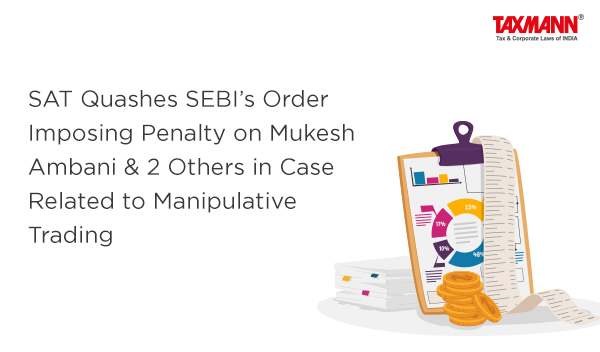SAT Quashes SEBI’s Order Imposing Penalty on Mukesh Ambani & 2 Others in Case Related to Manipulative Trading
- Blog|News|Company Law|
- 2 Min Read
- By Taxmann
- |
- Last Updated on 7 December, 2023

Case Details: Reliance Industries Ltd. v. Securities and Exchange Board of India - [2023] 157 taxmann.com 102 (SAT-Mumbai)
Judiciary and Counsel Details
-
- Justice Tarun Agarwala, Presiding Officer & Ms Meera Swarup, Technical Member
- Somasekhar Sundaresan, Ashwath Rau, Vivek Shetty, Ms Cheryl Fernandes & Harshit Jaiswal, Advs. for the Appellant. & Others
- Arvind Datar, Shiraz Rustomjee, Suraj Choudhary, Ms Shreya Parikh, Mihir Mody & Arnav Misra, Advs. for the Respondent. & Others
Facts of the Case
Earlier in 2021, the SEBI imposed a fine of Rs 25 crore on Reliance Industries Ltd, Rs 15 crore on Mukesh Ambani, Rs 20 crore on Navi Mumbai SEZ and Rs 10 crore in Mumbai SEZ in the Reliance Petroleum Limited (RPL) case.
The case revolved around the sale and purchase of RPL shares in both the cash and futures segments in November 2007. This transaction was prompted by RIL’s announcement in March 2007 to divest approximately 5% of its stake in RPL, a listed subsidiary. Notably, RPL was later merged with RIL in 2009.
The SEBI had stated that RIL appointed 12 agents to undertake transactions in the November 2007 RPL Futures. These 12 agents took short positions in the Futures and Options (F&O) segment on behalf of the company while the company undertook transactions in RPL shares in the cash segment.
Moreover, allegations were made that RIL violated PFUTP (Prohibition of Fraudulent and Unfair Trade Practices) rules by engaging in a carefully orchestrated operation with its designated agents, aiming to garner unwarranted profits from the sale of RPL shares in both the cash and the Futures & Options (F&O) segment.
Additionally, SEBI asserted that the company manipulated the settlement price of the November 2007 RPL Futures contract by strategically offloading a significant number of RPL shares in the cash segment during the final 10 minutes of trading on November 29, 2007. The funding for this manipulation scheme, as alleged, was provided by Navi Mumbai SEZ and Mumbai SEZ, supporting a network of 12 entities.
Consequently, an appeal was preferred with the SAT. The SAT observed that it cannot be suggested that the Managing Director is ipso facto responsible for every alleged contravention of law by the corporate entities.
Further, it was also observed that considering the compelling evidence presented in the form of minutes from two board meetings of RIL, which incontrovertibly demonstrates that two senior officials executed the contested trades without the appellant’s awareness, no responsibility can be attributed specifically to Mukesh Ambani.
SAT Held
The SAT held that there was an inordinate delay in issuing the show-cause notice. After 10 years, the show-cause notice was issued alleging that noticees (Navi Mumbai SEZ and Mumbai SEZ) were promoted by the Reliance Group and noticees were complicit and aided and abetted the manipulation of the trade executed by RIL through its 11 agents.
Further, it was also noted that the tribunal emphasized that while the Act and regulations do not specify a time limit for issuing a show-cause notice or completing adjudication proceedings, authorities are obligated to exercise their powers within a reasonable timeframe.
Disclaimer: The content/information published on the website is only for general information of the user and shall not be construed as legal advice. While the Taxmann has exercised reasonable efforts to ensure the veracity of information/content published, Taxmann shall be under no liability in any manner whatsoever for incorrect information, if any.

Taxmann Publications has a dedicated in-house Research & Editorial Team. This team consists of a team of Chartered Accountants, Company Secretaries, and Lawyers. This team works under the guidance and supervision of editor-in-chief Mr Rakesh Bhargava.
The Research and Editorial Team is responsible for developing reliable and accurate content for the readers. The team follows the six-sigma approach to achieve the benchmark of zero error in its publications and research platforms. The team ensures that the following publication guidelines are thoroughly followed while developing the content:
- The statutory material is obtained only from the authorized and reliable sources
- All the latest developments in the judicial and legislative fields are covered
- Prepare the analytical write-ups on current, controversial, and important issues to help the readers to understand the concept and its implications
- Every content published by Taxmann is complete, accurate and lucid
- All evidence-based statements are supported with proper reference to Section, Circular No., Notification No. or citations
- The golden rules of grammar, style and consistency are thoroughly followed
- Font and size that’s easy to read and remain consistent across all imprint and digital publications are applied



 CA | CS | CMA
CA | CS | CMA
